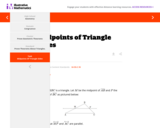
The goal of this task is to use similarity transformations to relate two triangles.
- Provider:
- Illustrative Mathematics
- Date Added:
- 06/22/2022

This collection contains highly recommended Secondary Mathematics IIIlessons, activities, and other resources from the eMedia library.

The goal of this task is to use similarity transformations to relate two triangles.

This is a reasonably direct task aimed at having students use previously-derived results to learn new facts about parallelograms, as opposed to deriving them from first principles.
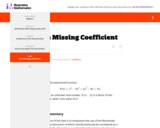
The purpose of this task is to emphasize the use of the Remainder Theorem (a discussion of which should obviously be considered as a prerequisite for the task) as a method for determining structure in polynomial in equations, and in this particular instance, as a replacement for division of polynomials.

A marine survey ship maps ocean depth by using sonar to reflect a sound pulse off the ocean floor. Figure A shows the ship's location at B on the surface of the ocean. The sonar apparatus aboard the ship is capable of emitting sound pulses in an arc measuring from 2 to 30 degrees. In two dimensions this arc is shown within Figure A by , and the emanating sound pulses are displayed by the dashed lines and the solid lines BA and BC.

Motels and hotels hire people to clean the rooms after each evening's use. Develop a mathematical model for the cleaning schedule and use of cleaning resources. Your model should include consideration of such things as stay-overs, costs, number of rooms, number of rooms per floor, etc. Draft a letter to the manger of a major motel or hotel complex that recommends your model to help them in the management of their operation.

A great deal of preparation must take place before a movie can be filmed. Important sets and scenes need to be identified, resource needs must be calculated, and schedules must be arranged. The issue of the schedule is the focus of the modeling activities. A large studio has contacted your firm, and they wish to have a model to allow for scheduling a movie. You are asked to answer the questions below. You should provide examples and test cases to convince the movie executives that your model is effective and robust.

The purpose of this task is to engage students in an open-ended modeling task that uses similarity of right triangles, and also requires the use of technology (e.g., printed or electronic maps), thereby illustrating SMP 5 - Use Appropriate Tools Strategically.

The basic idea is for students to demonstrate that they know what it means for two variables to be associated.

This is a challenging task which requires students to carefully divide up the picture into different pieces for which the area is known.

Mathematical modeling involves two equally important steps - building models based on real world situations and interpreting predictions made by those models back in the real world. This problem places equal emphasis on both steps.
We are at the start of the 2008 U.S. presidential elections, and one important area of debate is sure to be the national debt. As high school students, you have a particular interest in this subject since you are the people who will pay off or at least manage the national debt in the future. The rate at which the national debt changes depends on the difference between federal income (primarily taxes) and federal expenditures. Your first task is to build a model that can be used to help understand the national debt and make forecasts based on different assumptions. As usual, modeling involves a balance between so much complexity that the model may be intractable and so little complexity that it is unrealistic and useless. Your model needs, at the very least, to allow you to consider different tax policies and different expenditure policies.

Honeybees, along with a few other key animals, are critical to human existence on our planet. Along with honey production, these insects provide the vital role of pollination of many trees and plants that provide food for our survival. In 2007, the term Colony Collapse Disorder (CCD) was created to describe the decline of honeybee populations around the world.[1] Bee decline can be attributed to factors such as viruses, pesticides, predators, habitat destruction, and environmental conditions.

This task applies geometric concepts, namely properties of tangents to circles and of right triangles, in a modeling situation.

The coffee cooling experiment in this task is a popular example of an exponential model with immediate appeal. The model is realistic and provides a good context for students to practice work with exponential equations.

In 2014, the world saw the infectious Ebola virus spreading in western Africa. Throughout human history, epidemics have come and gone with some infecting and/or killing thousands and lasting for years and others taking less of a human toll. Some believe these events are just nature’s way of controlling the growth of a species while others think they could be a conspiracy or deliberate act to cause harm. This problem will most likely come down to how to expend (or not expend) scarce resources (doctors, containment facilities, money, research, serums, etc...) to deal with a crisis.
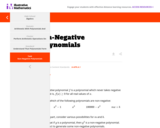
The task helps foster student understanding of the analogy described in the standard -- "Understand that polynomials form a system analogous to the integers..." -- in addition to having the same arithmetic operations available, there are many other instances in which integers and polynomials share common properties.
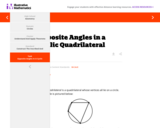
The goal of this task is to show that opposite angles in a cyclic quadrilateral are supplementary.
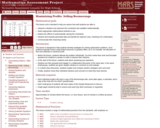
This lesson unit is intended to help educators assess how well students are able to interpret a situation and represent the constraints and variables mathematically, select appropriate mathematical methods to use, explore the effects of systematically varying the constraints, and interpret and evaluate the data generated and identify the optimum case, checking it for confirmation.

This high level task is an example of applying geometric methods to solve design problems and satisfy physical constraints.

This is a very open-ended task designed for students to develop some of the basic ideas surrounding exponential growth.
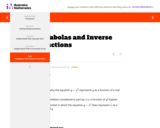
This task assumes students have an understanding of the relationship between functions and equations. Using this knowledge, the students are prompted to try to solve equations in order to find the inverse of a function given in equation form: when no such solution is possible, this means that the function does not have an inverse.